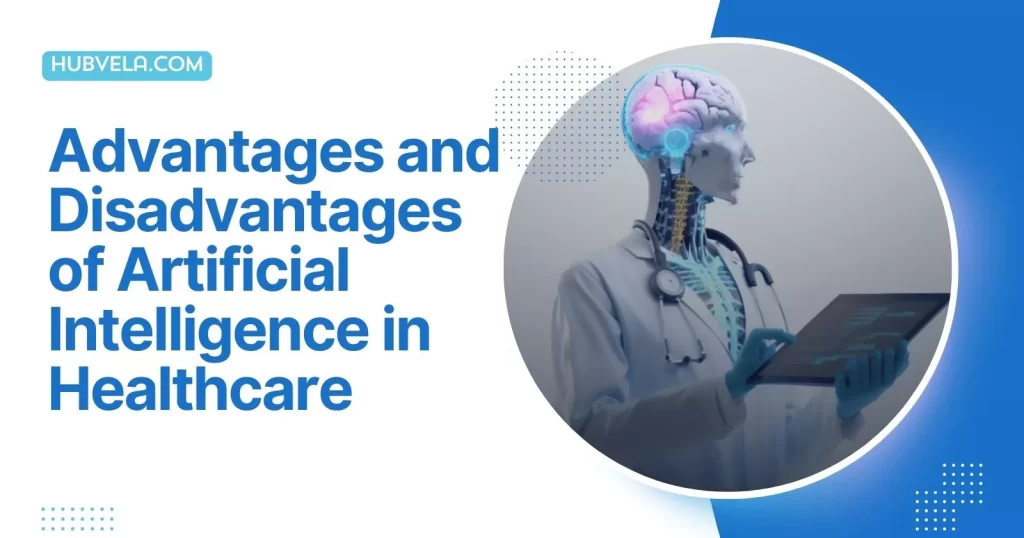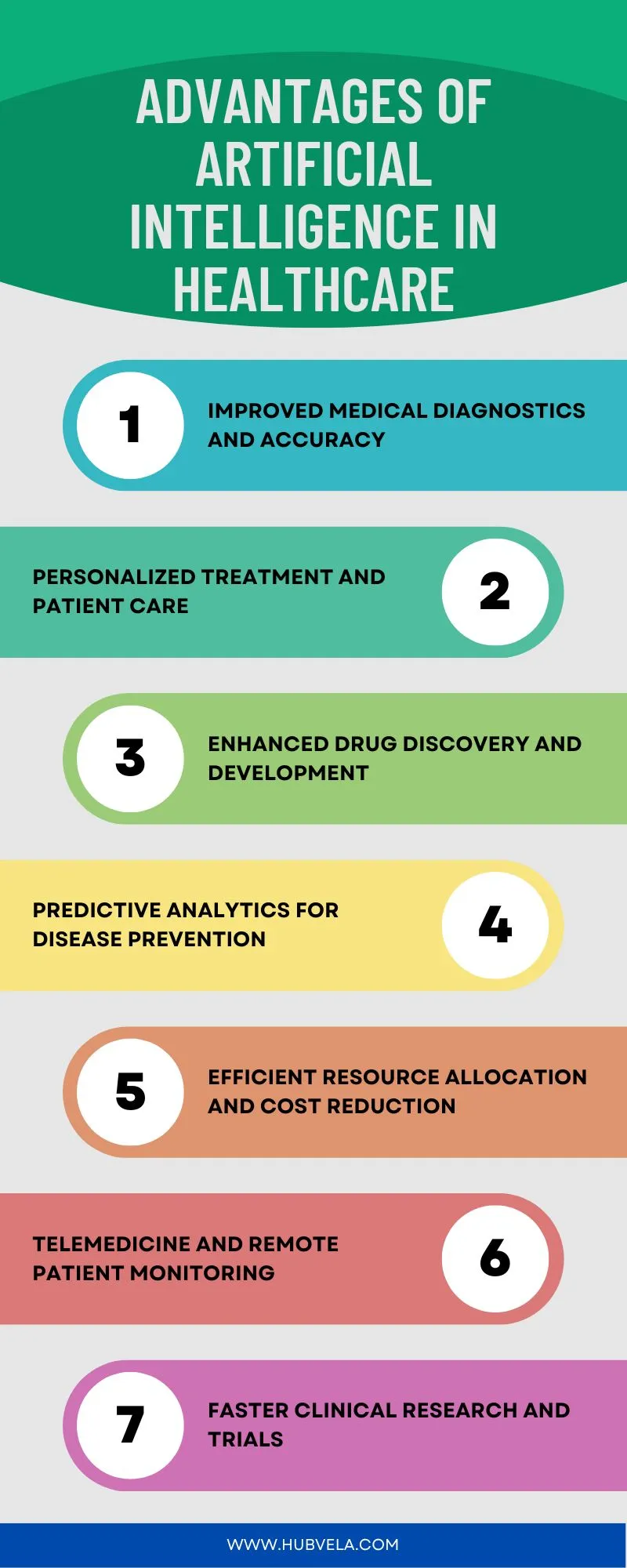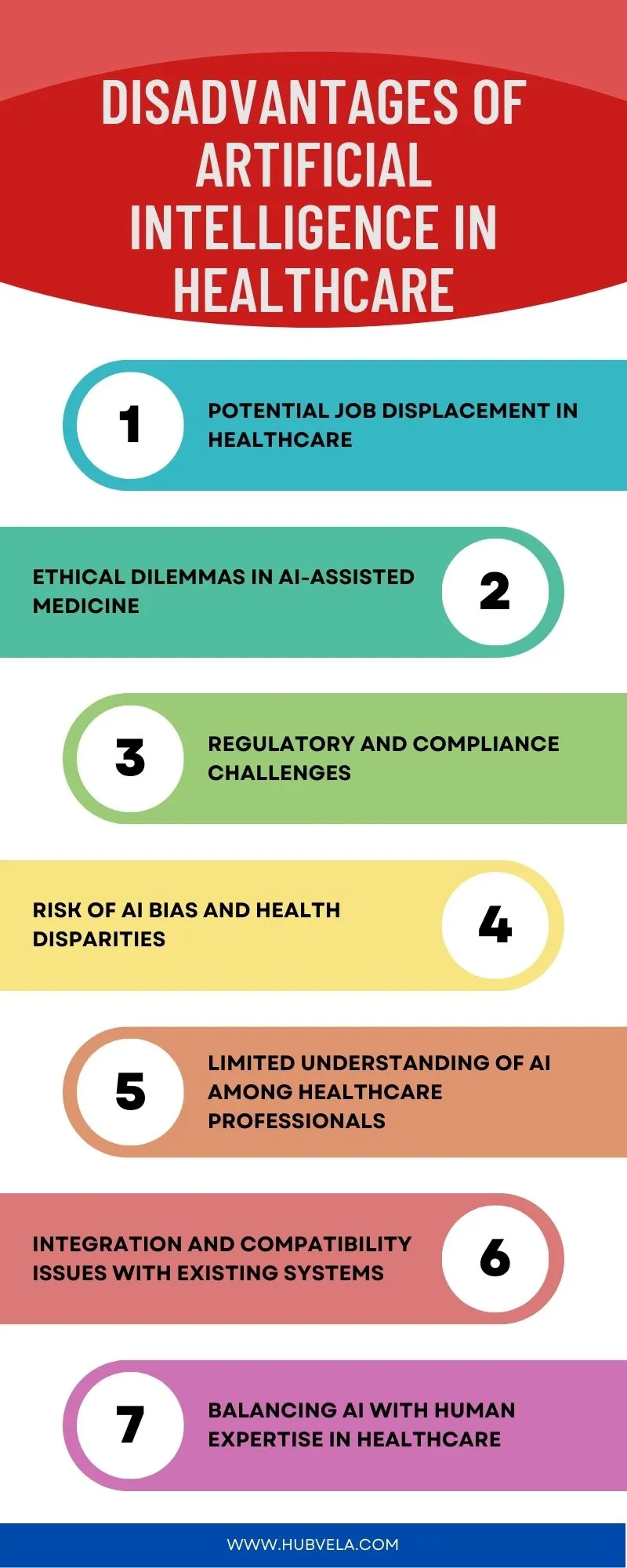Artificial Intelligence (AI) is a rapidly growing technology that is transforming various industries, including healthcare. AI has the potential to streamline tasks, improve operational efficiencies, and simplify complex procedures.
However, as with any new technology, there are advantages and disadvantages of AI in healthcare that need to be considered.
The advantages of AI in healthcare include the ability to analyze data and improve diagnosis, better patient care, reduced cost of care, and real-time access to information.
On the other hand, the disadvantages of AI in healthcare include potential ethical and privacy concerns, as AI systems rely heavily on patient data.
In this article, we will explore both the advantages and disadvantages of Artificial Intelligence in healthcare to provide a comprehensive understanding of this technology.

--Advertisement--
Advantages of Artificial Intelligence in Healthcare
Artificial Intelligence (AI) has become an integral part of modern healthcare, enabling health practitioners to streamline tasks, improve operational efficiencies, and simplify complex procedures.
Large tech companies are investing more funding into AI healthcare innovations. For instance, Microsoft announced a five-year $40 million program in 2020 to address healthcare challenges.
AI in healthcare is getting more sophisticated and efficient at supporting doctors and other medical professionals.
Not only does this provide a real opportunity for growth within the profession, but it also means that tasks can be completed more quickly and at a lower cost.
AI has the potential to revolutionize healthcare in many ways, including personalized treatment design, improved diagnostic speed and accuracy, and better patient care. We will explore the advantages of artificial intelligence in healthcare in detail.

1. Improved Medical Diagnostics and Accuracy
Artificial Intelligence (AI) has revolutionized the healthcare industry by improving medical diagnostics and accuracy. AI algorithms can analyze vast amounts of medical data and identify patterns that may be difficult for humans to detect.
This can lead to earlier and more accurate diagnoses, which can ultimately save lives. AI-powered diagnostic tools can also reduce the risk of human error and improve the efficiency of medical professionals.
For example, AI can help radiologists detect and diagnose cancerous tumors more accurately and quickly. Additionally, AI can help predict patient outcomes and identify potential health risks, allowing healthcare providers to take preventative measures.
AI has the potential to greatly improve medical diagnostics and accuracy, leading to better patient outcomes and a more efficient healthcare system.
2. Personalized Treatment and Patient Care
With the help of AI, healthcare providers can develop personalized treatment plans for patients based on their unique genetic makeup and medical history.
AI can analyze large amounts of patient data in real time and make informed decisions quickly, which can lead to better patient outcomes and reduced risk of adverse drug reactions.
Additionally, AI can predict and prevent diseases before they occur by analyzing patient data and detecting patterns.
The convergence of precision medicine and AI will likely accelerate the goals of personalized care and tightly couple AI to healthcare providers for the foreseeable future.
As AI technology continues to evolve and become more widely adopted, we can expect even greater benefits in terms of both cost savings and quality of care.
3. Enhanced Drug Discovery and Development
The use of artificial intelligence (AI) in healthcare has revolutionized the drug discovery and development process. AI algorithms can analyze vast amounts of data and identify patterns that would be impossible for humans to detect.
This has led to the development of more effective drugs in a shorter amount of time. AI can also help predict potential side effects and drug interactions, allowing for safer medications.
Additionally, AI can assist in clinical trials by identifying suitable candidates and monitoring their progress.
The use of AI in drug discovery and development has the potential to significantly improve patient outcomes and reduce healthcare costs.
4. Predictive Analytics for Disease Prevention
Predictive analytics in healthcare is a powerful tool that is reshaping the healthcare industry.
By utilizing predictive models and data-driven insights, healthcare organizations can detect potential problems before they arise, anticipate future needs of their patients, and identify trends in population health more quickly and accurately than ever before.
With the help of artificial intelligence like machine learning, this predictive modeling in healthcare technology is helping to make the healthcare system smarter, more efficient, and more responsive to the needs of patients.
Predictive analytics in healthcare refers to the analysis of current and historical healthcare data that allows healthcare professionals to find opportunities to make more effective and more efficient operational and clinical decisions, predict trends, and even manage the spread of diseases.
By integrating predictive analytics into the healthcare system, providers have seen benefits for both themselves and patients.
Predictive analytics allows for healthcare workers to quickly analyze data and plan a course of treatment that will work best for their patients, saving time and producing better outcomes.
5. Efficient Resource Allocation and Cost Reduction
Artificial Intelligence (AI) has the potential to significantly reduce healthcare costs and improve resource allocation.
AI-based systems can help reduce inefficiencies in the healthcare system, resulting in a more efficient and cost-effective health ecosystem.
Implementing AI technology in healthcare can not only reduce costs but also help organizations maximize their ROI.
AI and automation solutions can streamline administrative tasks, such as patient registration, patient data entry, and claims processing, reducing the cost of care delivery.
AI tools can speed up healthcare administrative operations, like the transcription of medical notes, by eliminating manual data entry, correcting human error, and automatic processing of electronic health records (EHR), reducing administrative burden and costs.
According to a new report from McKinsey and Harvard researchers, broader adoption of AI could lead to savings between 5% and 10% in healthcare spending, or roughly $200 billion to $360 billion a year.
The adoption of AI/ML models in healthcare has substantially reduced labor costs and freed doctors from tedious manual work.
Therefore, efficient resource allocation and cost reduction are some of the significant advantages of AI in healthcare.
6. Telemedicine and Remote Patient Monitoring
Telemedicine and remote patient monitoring have become increasingly important in healthcare, especially with the rise of telehealth services.
Artificial intelligence (AI) is playing a significant role in improving patient care in telemedicine. AI can help monitor patients, provide feedback, and alert to early warning signs of disease progression.
One of the key benefits of remote patient monitoring with AI is that it enables real-time monitoring of a patient’s health, leading to early detection of potential health issues.
AI in telemedicine helps divert time away from administrative tasks to medical care, allowing healthcare providers to spend more time performing medical procedures instead of administrative tasks.
AI-enabled telehealth offers contributions in the form of quality improvement and enhancement of existing practice, as well as the instigation of new models of care.
Remote patient monitoring with AI has enabled doctors to gain real-time insights into their patient’s health status, accelerating at-home care.
In the future, AI will likely play an even bigger role in improving the quality and accessibility of healthcare services.
7. Faster Clinical Research and Trials
Artificial Intelligence (AI) has the potential to revolutionize clinical trials by enabling faster and more accurate hypothesis generation and analysis.
AI can simulate data to detect more efficient statistical outcome measures, predict participant outcomes, and identify those most likely to progress fast and reach endpoints sooner, leading to shorter duration trials.
By taking repetitive tasks away from human personnel, AI accelerates the time to market for life-saving drugs and frees up man-hours for more specialist tasks.
AI can also improve patient monitoring during clinical trials, leading to better patient safety and more efficient drug development.
By analyzing past and present trial data, AI can be used to inform future research, with machine learning able to optimize trial design and patient recruitment.
AI offers optimization opportunities across every stage of clinical research, enabling companies to complete studies faster and get life-saving medicines and treatments to patients more quickly.
Disadvantages of Artificial Intelligence in Healthcare
Artificial Intelligence (AI) has been making significant strides in the healthcare industry, revolutionizing the way healthcare providers deliver care to patients.
AI has the potential to automate tedious tasks, streamline processes, and improve data accessibility, which can assist healthcare professionals in taking the right steps to prevent illness and inform diagnoses in real time.
However, as with any new technology, there are also potential disadvantages to consider. We will explore the disadvantages of artificial intelligence in healthcare.

1. Potential Job Displacement in Healthcare
Artificial intelligence (AI) has the potential to transform the healthcare industry, but it may also lead to job displacement.
Although there have been no jobs eliminated by AI in healthcare so far, AI is likely to transform the role of healthcare providers, and may even dramatically change the provider-patient relationship.
AI has the potential to automate tedious tasks, freeing up clinician schedules to allow for more patient care. However, AI may also render some jobs redundant, presenting equity challenges.
Some healthcare professionals might view AI as a job-killer, but advanced machine learning may actually create more employment opportunities in the industry than it eliminates.
The healthcare industry is likely to be one of the biggest beneficiaries of the job-creation curve.
2. Ethical Dilemmas in AI-Assisted Medicine
Artificial intelligence (AI) has the potential to revolutionize healthcare, but it also raises ethical dilemmas that must be addressed.
The use of AI in healthcare requires practitioners and specialists to consider ethical dilemmas such as privacy and data protection, informed consent, social gaps, medical consultation, empathy, and sympathy.
Informed consent to use, safety and transparency, algorithmic fairness and biases, and data privacy are the primary ethical challenges of AI in healthcare.
To fully achieve the potential of AI in healthcare, four major ethical issues must be addressed: informed consent to use data, safety, algorithmic fairness and biases, and data privacy.
The ethical complexities that AI technology can introduce are not well understood by the medical community, and there is a need for a rich discussion that would benefit from physician input.
The use of AI in healthcare raises questions about the advantages and limitations of this technology, and privacy becomes an issue when incorporating an AI system.
Therefore, it is crucial that AI is implemented in the healthcare system ethically and legally, and practitioners and specialists should consider all four medical ethics principles, including autonomy, beneficence, nonmaleficence, and justice in all aspects of healthcare.
3. Regulatory and Compliance Challenges
The use of artificial intelligence (AI) in healthcare has the potential to revolutionize the industry, but it also presents regulatory and compliance challenges.
The regulation of AI and machine learning needs to catch up with technological advances to ensure that they do not hold back progress.
The challenges of regulating AI in healthcare include instilling trust among healthcare providers and patients, adhering to laws, regulations, rules, and requirements, and creating regulatory frameworks that companies can comply with.
The speed of AI developments and the components of AI that need to be regulated are also challenges that need to be addressed.
It is crucial that AI is implemented in the healthcare system ethically and legally, and clear and flexible regulation will help put this groundbreaking tech and companies that create and utilize it on a much firmer legal footing.
4. Risk of AI Bias and Health Disparities
Artificial intelligence (AI) has the potential to simplify healthcare systems and advance medical research, but it also poses several risks and challenges.
One of the major risks is the potential for AI bias and health disparities. AI systems learn from the data on which they are trained, and they can incorporate biases from those data.
For instance, if the data available for AI are principally gathered in academic medical centers, the resulting AI systems will know less about—and therefore will treat less effectively—patients from populations that do not typically frequent academic medical centers.
Even if AI systems learn from accurate, representative data, there can still be problems if that data is incomplete or biased.
Researchers have noted that several biases found in AI design perpetuate healthcare disparities, and the lack of diverse digital datasets for machine learning algorithms can amplify systematic underrepresentation of certain populations, posing a real risk of AI bias.
To mitigate these risks, open science tools can help address bias in healthcare AI.
5. Limited Understanding of AI Among Healthcare Professionals
One of the disadvantages of artificial intelligence (AI) in healthcare is the limited understanding of AI among healthcare professionals.
According to a research article published in BMC Medicine, there are currently limited examples of AI techniques being successfully deployed into clinical practice.
The potential of AI in healthcare has not been realized to date, with limited existing reports of the clinical and cost benefits that have arisen from real-world use of AI algorithms in clinical practice.
The article explores the main challenges and limitations of AI in healthcare and considers the steps required to translate these potentially transformative technologies from research to clinical practice.
Another article published in STAT News highlights the challenges uncovered by a project that evaluated AI systems in hospitals. The evaluation of AI systems often leaves hospitals with a limited understanding of how they will perform in live clinical situations.
The real difficulty lies in figuring out how to incorporate the technology into the daily routines of doctors and nurses, and the complicated care-delivery and technical systems that surround them.
AI must be finely tuned to those environments and evaluated within them, so that its benefits and costs can be clearly understood and compared.
A new Pew Research Center survey explores public views on AI in health and medicine. The survey found that 60% of Americans would be uncomfortable with a provider relying on AI in their own healthcare.
Concern over the pace of AI adoption in healthcare is widely shared across groups in the public, including those who are the most familiar with AI technologies.
The limited understanding of AI among healthcare professionals is a significant disadvantage of AI in healthcare.
The challenges of incorporating AI into daily routines and evaluating its performance in live clinical situations must be addressed to realize the potential benefits of AI in healthcare.
6. Integration and Compatibility Issues with Existing Systems
Integration and compatibility issues with existing systems are among the drawbacks of artificial intelligence (AI) in healthcare.
One of the challenges of AI in healthcare is that medical data from one organization may not be compatible with other platforms due to interoperability problems.
This can lead to difficulties in integrating AI systems with existing healthcare systems, which can hinder the adoption of AI in healthcare.
Another issue is that AI systems may require significant changes to existing healthcare workflows, which can be challenging to implement.
Additionally, AI systems may not be compatible with all types of medical data, which can limit their usefulness in certain healthcare settings.
To overcome these challenges, healthcare organizations need to carefully plan and implement AI systems to ensure that they are compatible with existing systems and workflows.
They also need to ensure that AI systems are designed to work with a wide range of medical data types and formats.
Finally, healthcare organizations need to invest in training and education programs to help healthcare professionals adapt to new AI systems and workflows.
7. Balancing AI with Human Expertise in Healthcare
Artificial Intelligence (AI) has the potential to revolutionize healthcare by improving patient outcomes, reducing costs, and increasing efficiency. However, there are also several disadvantages of AI in healthcare that need to be addressed.
One of the main concerns is the need to balance AI with human expertise. While AI can analyze vast amounts of data and provide insights, it cannot replace the human touch and empathy that is essential in healthcare.
AI can assist healthcare professionals in making decisions, but it cannot replace them.
Another disadvantage of AI in healthcare is the potential for ethical and privacy concerns. AI algorithms can be biased, leading to unequal treatment of patients.
Additionally, AI can be vulnerable to hacking, leading to data breaches and privacy violations. It is essential to ensure that AI is developed ethically, safely, and meaningfully in healthcare.
Furthermore, the implementation of AI in healthcare requires significant investment in infrastructure, training, and maintenance.
This can be a significant barrier to adoption, particularly for smaller healthcare providers. Additionally, there is a risk of creating unemployment as AI takes over some tasks traditionally performed by humans.
While AI has the potential to transform healthcare, it is essential to balance it with human expertise. AI can assist healthcare professionals in making decisions, but it cannot replace them.
Additionally, ethical and privacy concerns need to be addressed, and significant investment is required for successful implementation.
Conclusion on Advantages and Disadvantages of Artificial Intelligence in Healthcare
In conclusion, Artificial intelligence (AI) has the potential to transform many aspects of healthcare, enabling a future that is more personalized and efficient.
AI can support diagnostic, treatment, and prediction outcomes in many medical fields.
However, there are also challenges and risks associated with the implementation of AI in healthcare, including gaps and challenges in the healthcare sector and the need to facilitate the integration of AI into the efficiency of health service management as well as making medical decisions.
Despite these challenges, AI has an important role to play in the healthcare offerings of the future, and its involvement in medicine is gradually changing medical practice.


